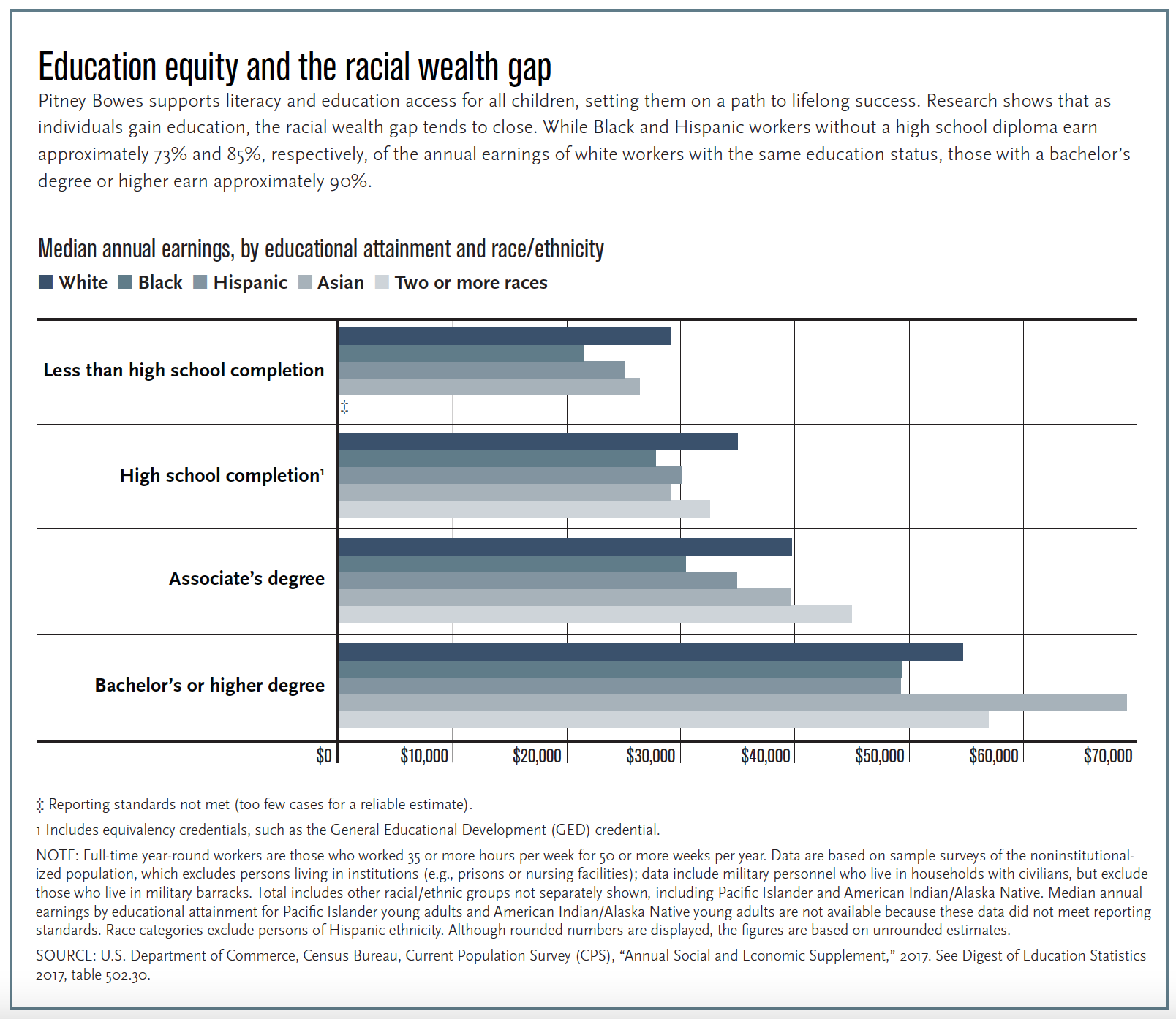Why Businesses Should Support Access to Quality Education
Mar 08, 2022
In an editorial for The Corporate Citizen, a quarterly published by Boston College’s Center for Corporate Citizenship, Pitney Bowes President & CEO Marc Lautenbach makes the case for why it’s important for successful companies to support education equity in the communities where they do business.
From the Corner Office
Executive Perspective: Education Equity
by Marc Lautenbach, President & CEO, Pitney Bowes
I have always believed that successful companies create long term value effectively by answering four questions: First, why do employees work for you; second, why do customers buy from you; third, why do communities allow you license to operate within their locales; and finally, why do investors give you the capital to run your business? Some call this stakeholder management, and maybe it is. I call it running a business. Limit focus on one of these priorities to favor another and any advantage you create will be ephemeral.
In that spirit, at Pitney Bowes we bring our sense of optimism, integrity, and empathy to our communities around the world. Through our philanthropy and through the generous participation of employees at every level, we support literacy and education to open access to equity and opportunity for all children. We strive to help all students have a better opportunity to grow to their full potential.
To be a truly inclusive society, we all need a fair and equitable playing ground. For this much is certain, upward mobility is highly correlated with the quality of a child’s education. Unfortunately, a child’s economic future is too often dependent upon circumstances beyond their control. The place a child grows up, their race, and their family’s income heavily influence their ability to move up the socioeconomic ladder. Children from families on the lower rungs of that ladder have differential access to quality education, employment and wealth-building opportunities. Those with better access tend to have correspondingly better overall health and higher quality of life than those with limited access to those opportunities.
These past few years have taught us that now, more than ever, we have a responsibility to our communities, as business leaders and citizens, to meet this moment of exacerbated, deep societal divides by uniting to take action for real positive change. For me, it meant taking a new approach to supporting students most in need in our home office community of Fairfield County, Connecticut.
I was pleased to help launch a business collaborative for education equity in conjunction with Fairfield County’s Community Foundation and other local businesses of all sizes who have joined forces to fund needed programs in urban school districts throughout the area.
“The COVID-19 pandemic laid bare vast disparities that have long existed in our region, including educational inequities that exist for our youngest residents and students who represent the future of Fairfield County,” said Juanita James, president and CEO, Fairfield County’s Community Foundation. “The vision and community spirit of the collaborative’s founding members led to an understanding that greater impact is possible when they work together towards advancing lasting solutions that will give children an opportunity to grow, learn, and stay in Fairfield County.”
We’ve created a multi-year local impact and funding collaborative focused on helping to reduce and eliminate educational disparities among our region’s most vulnerable pre-K through 12+ students and their parents and guardians, teachers, and staff. Our efforts focus on measurable near- and long-term education-related initiatives in our urban centers with an initial focus on early childhood education, high school students, and hunger relief for all students. Our work includes support for local nonprofit organizations and initiatives with financial contributions, employee volunteerism and expertise, mentorship and internship opportunities, advocacy, and other resources.
Since its launch in the fall of 2020, the Fairfield County Business Collaborative for Education Equity has:
• Advocated successfully for a non-profit’s ability to serve students on-site at schools
• Provided public school teachers with classroom materials through a Donors Choose campaign that that supported nearly 250 projects and reached nearly 25,000 student experiences across 39 schools
• Helped prepare more than 1,000 laptops for public school students through employee volunteer efforts
• Raised $1.4 million from seven founding companies to support educational programs in the coming years and continue efforts to recruit new members
• Distributed our first round of grants—$300,000—to seven nonprofits
This is a strong beginning, and a sustained focus on the issues will make the real difference. In a July 27, 2021, article titled “COVID-19 and education: The lingering effects of unfinished learning,” McKinsey reported on COVID-19’s impact on elementary students in more than 40 states, noting that students from predominantly low-income schools and in urban locations lost significantly more learning during the pandemic than their peers in high-income rural and suburban schools.
At Pitney Bowes, we attribute much of our success to our capacity for self-renewal, a quality that has helped move forward all aspects of our business for more than 100 years—including our commitment to supporting our communities in meaningful and sustainable ways.
We had this in mind when we helped create this business collaborative. In a very short time, we have seen the strength in working together and the promise that this partnership can accomplish in building resiliency and opportunity for all. I invite other companies to join us in Fairfield County, and I encourage companies in other communities to work together to help build brighter, more equitable futures for all children and families.
– Originally published in the Winter 2022 Issue 39 of The Corporate Citizen.


